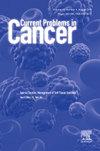Revolutionizing lung cancer treatment: Introducing PROTAC therapy as a novel paradigm in targeted therapeutics
IF 2.3
4区 医学
Q3 ONCOLOGY
引用次数: 0
Abstract
This comprehensive review explores the transformative potential of PROTAC (Proteolysis-Targeting Chimeras) therapy as a groundbreaking approach in the landscape of lung cancer treatment. The introduction provides a succinct overview of current challenges in lung cancer treatment, emphasizing the significance of targeted therapies. Focusing on PROTAC therapy, the article elucidates its mechanism of action, comparing it with traditional targeted therapies and highlighting the key components and design principles of PROTAC molecules. In the context of lung cancer, the review meticulously summarizes preclinical evidence, emphasizing efficacy and specificity gleaned from studies evaluating PROTAC therapy. It delves into the implications of this preclinical data, discussing potential advantages over existing targeted therapies. An update on ongoing clinical trials involving PROTAC therapy for lung cancer offers a snapshot of the current progress, with a summary of key outcomes and advancements in early-phase trials. The mechanistic insights into PROTAC therapy's impact on lung cancer cells are explored, alongside a discussion on potential biomarkers for patient stratification and response prediction. The influence of tumor heterogeneity on PROTAC therapy outcomes is also addressed. Safety and tolerability assessments, encompassing preclinical and clinical studies, are comprehensively evaluated, including a comparative analysis with traditional targeted therapies and strategies to mitigate side effects. Looking forward, the article discusses the future perspectives of PROTAC therapy in lung cancer treatment and addresses ongoing challenges, providing a nuanced exploration of potential combination therapies and synergistic approaches. In conclusion, the review summarizes key findings and insights, underscoring the tremendous potential of PROTAC therapy as a promising and innovative avenue in pursuing more effective lung cancer treatments.

革命性的肺癌治疗:引入PROTAC治疗作为靶向治疗的新范式。
这篇全面的综述探讨了PROTAC(蛋白水解靶向嵌合体)疗法作为肺癌治疗领域的一种突破性方法的变革潜力。引言简要概述了当前肺癌治疗面临的挑战,强调了靶向治疗的重要性。本文以PROTAC治疗为重点,阐述了其作用机制,并与传统靶向治疗进行了比较,重点介绍了PROTAC分子的关键成分和设计原则。在肺癌的背景下,该综述精心总结了临床前证据,强调了从评估PROTAC治疗的研究中收集到的疗效和特异性。它深入研究了这些临床前数据的含义,讨论了相对于现有靶向治疗的潜在优势。正在进行的涉及PROTAC治疗肺癌的临床试验的最新情况提供了当前进展的快照,并总结了早期试验的主要结果和进展。本文探讨了PROTAC治疗对肺癌细胞影响的机制,并讨论了用于患者分层和反应预测的潜在生物标志物。肿瘤异质性对PROTAC治疗结果的影响也被讨论。安全性和耐受性评估,包括临床前和临床研究,全面评估,包括与传统靶向治疗和减轻副作用策略的比较分析。展望未来,本文讨论了PROTAC治疗在肺癌治疗中的未来前景,并解决了当前的挑战,提供了潜在的联合治疗和协同方法的细致探索。总之,本综述总结了主要发现和见解,强调了PROTAC治疗作为一种有前景的创新途径在寻求更有效的肺癌治疗方面的巨大潜力。
本文章由计算机程序翻译,如有差异,请以英文原文为准。
求助全文
约1分钟内获得全文
求助全文
来源期刊

Current Problems in Cancer
医学-肿瘤学
CiteScore
5.10
自引率
0.00%
发文量
71
审稿时长
15 days
期刊介绍:
Current Problems in Cancer seeks to promote and disseminate innovative, transformative, and impactful data on patient-oriented cancer research and clinical care. Specifically, the journal''s scope is focused on reporting the results of well-designed cancer studies that influence/alter practice or identify new directions in clinical cancer research. These studies can include novel therapeutic approaches, new strategies for early diagnosis, cancer clinical trials, and supportive care, among others. Papers that focus solely on laboratory-based or basic science research are discouraged. The journal''s format also allows, on occasion, for a multi-faceted overview of a single topic via a curated selection of review articles, while also offering articles that present dynamic material that influences the oncology field.
 求助内容:
求助内容: 应助结果提醒方式:
应助结果提醒方式:


